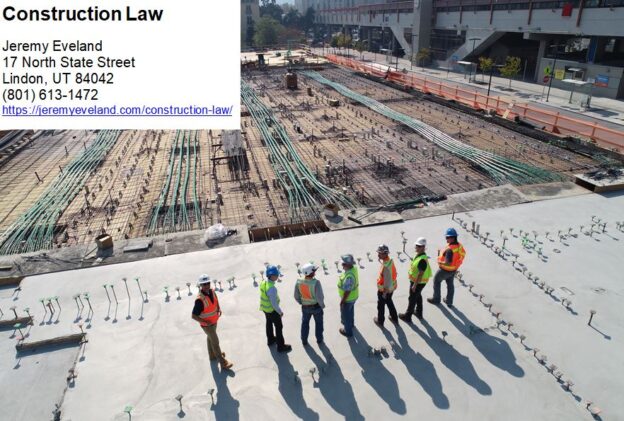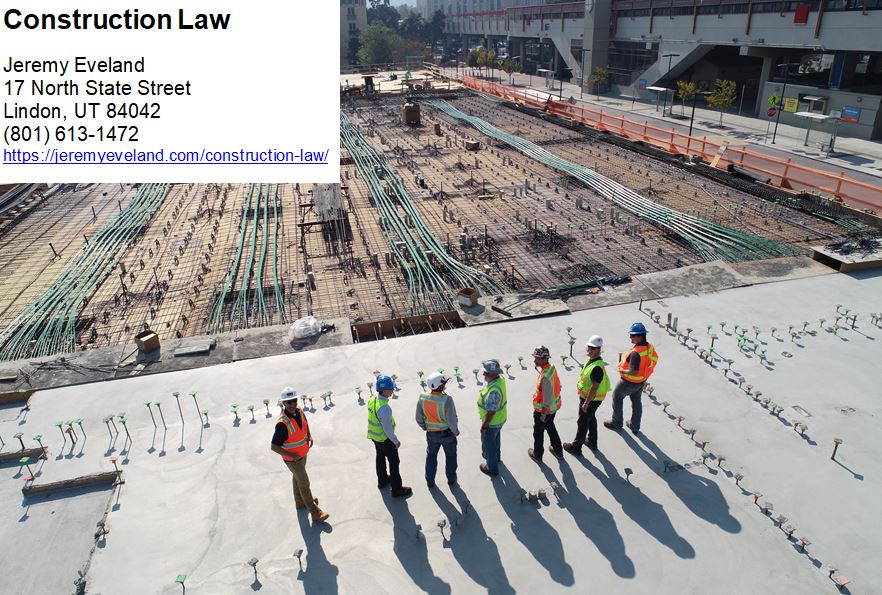Are you considering investing in a commercial real estate project? It’s important to be aware of the potential environmental impact that these projects can have. Environmental Impact Statements play a crucial role in assessing and mitigating the environmental risks associated with commercial real estate developments. In this article, we will explore the significance of Environmental Impact Statements and how they can protect both the environment and your investment. By understanding the importance of these statements, you can make informed decisions and ensure that your commercial real estate project is environmentally responsible. If you have any questions or concerns regarding Environmental Impact Statements in commercial real estate projects, don’t hesitate to contact lawyer Jeremy Eveland for a consultation.
Why are Environmental Impact Statements Important?
Definition of Environmental Impact Statement
An Environmental Impact Statement (EIS) is a document that assesses and analyzes the potential environmental effects of a proposed project or action. It provides a detailed and comprehensive evaluation of the anticipated impacts on the natural and human environment, including social, economic, and cultural aspects.
Purpose of Environmental Impact Statements
The primary purpose of an EIS is to inform decision-makers, project proponents, and the public about the potential environmental consequences of a proposed project. It ensures that all relevant information is considered, enabling informed decision-making that takes into account the environmental effects and possible alternatives.
Legal requirement for Environmental Impact Statements
Environmental Impact Statements are a legal requirement in many jurisdictions. In the United States, the National Environmental Policy Act (NEPA) mandates the preparation of EIS for federal projects. State and local laws may also require the submission of an EIS for certain projects. Failure to comply with these legal requirements can lead to delays, fines, and legal challenges.
Benefits of Environmental Impact Statements
Environmental Impact Statements provide several key benefits, including:
-
Informed Decision-Making: EISs ensure that decision-makers have access to comprehensive and accurate information regarding a project’s potential environmental impacts. This information allows for informed decision-making that takes into account environmental considerations.
-
Public Transparency: EISs provide an opportunity for the public to understand and provide input on proposed projects. They promote transparency and allow for public involvement in the decision-making process, fostering trust and accountability.
-
Identification of Alternatives and Mitigation: EISs require the evaluation of feasible alternatives to the proposed project, allowing decision-makers to consider less environmentally damaging options. They also identify potential mitigation measures to minimize or offset adverse impacts.
-
Protection of the Environment: By assessing and analyzing the potential environmental effects, EISs help identify potential risks and impacts, enabling proactive measures to protect the environment and mitigate negative consequences.
-
Avoidance of Legal Challenges: Compliance with legal requirements for EIS preparation helps prevent legal challenges and potential project delays. A thorough and well-prepared EIS reduces the risk of litigation by addressing potential issues upfront.
The Process of Preparing an Environmental Impact Statement
Preparing an Environmental Impact Statement involves a multi-step process that includes various stages and activities. Understanding this process is essential for ensuring a comprehensive and accurate assessment of a project’s environmental impacts.
Initial Project Assessment
The first step in the EIS process is the initial project assessment. This involves reviewing the proposed project and determining the scope and scale of the potential impacts on the environment. The assessment helps identify the key issues that need to be addressed in the EIS.
Scoping
Scoping is the process of identifying the specific environmental issues and concerns that will be addressed in the EIS. It involves consulting with relevant stakeholders, agencies, and the public to gather input and ensure a comprehensive assessment of potential impacts.
Data Collection and Analysis
Once the project is scoped, data collection and analysis are conducted to gather information on the project and its potential impacts. This includes collecting data on the existing environment, such as air quality, water resources, wildlife, and cultural resources. The data is then analyzed to assess the potential impacts of the proposed project.
Public Involvement
Public involvement is a crucial part of the EIS process. It provides an opportunity for the public to review and comment on the proposed project and its potential impacts. Public input helps ensure that all perspectives and concerns are considered in the decision-making process.
Mitigation Measures
Mitigation measures aim to reduce or eliminate potential adverse environmental impacts. The EIS identifies and evaluates potential mitigation measures and assesses their effectiveness in mitigating the impacts. These measures can include actions such as habitat restoration, pollution control, or community enhancements.
Drafting the Environmental Impact Statement
Based on the data collected, analysis conducted, and public input received, the EIS is drafted. This document provides a detailed assessment of the environmental impacts, alternatives considered, and mitigation measures proposed. It also includes an analysis of the cumulative impacts of the proposed project in conjunction with other existing or planned actions.
Review and Approval Process
Once the EIS is drafted, it undergoes a review and approval process. The document is typically reviewed by relevant government agencies, stakeholders, and the public. Feedback and comments are considered, and any necessary revisions are made before the final EIS is approved.

Key Components of an Environmental Impact Statement
Environmental Impact Statements typically include several key components that provide a comprehensive analysis of a proposed project’s environmental effects.
Project Description
The project description section provides a detailed overview of the proposed project, including its purpose, location, design, and construction methods. It provides the necessary context for assessing the potential environmental impacts.
Description of Affected Environment
This section details the existing environmental conditions in the project area. It includes information on air quality, water resources, flora and fauna, cultural resources, and other relevant factors. It establishes a baseline against which the potential impacts can be assessed.
Analysis of Environmental Impacts
The analysis of environmental impacts identifies and evaluates the potential effects of the proposed project on the environment. It considers both direct and indirect impacts, including those on air and water quality, natural habitats, wildlife, ecosystems, noise levels, and aesthetics.
Alternatives Analysis
An alternatives analysis assesses the feasible alternatives to the proposed project. It considers alternative locations, designs, technologies, or methods that could potentially reduce adverse impacts. The analysis compares the potential environmental effects of each alternative to help decision-makers identify the most environmentally preferable option.
Mitigation Measures
This component outlines the proposed mitigation measures aimed at reducing or offsetting adverse environmental impacts. It includes specific actions or strategies that will be implemented to minimize or mitigate potential harm. The effectiveness and feasibility of these measures are evaluated to ensure their practicality.
Evaluation of Cumulative Impacts
The cumulative impacts evaluation considers the combined effects of the proposed project in conjunction with other existing or planned actions in the area. It assesses the cumulative effects on resources, such as air quality, water supply, transportation, and community services to determine if any significant adverse impacts are likely to occur.
Monitoring and Reporting
This section establishes a monitoring and reporting plan to track and assess the implementation and effectiveness of mitigation measures. It defines the metrics, methodologies, and frequency of monitoring, as well as the reporting requirements for documenting and communicating the project’s actual environmental impacts.
Summary and Conclusions
The summary and conclusions section provides a concise overview of the key findings and outcomes of the EIS. It summarizes the significant impacts, outlines the alternatives considered, and highlights the proposed mitigation measures. Conclusions are drawn based on the analysis conducted, public input received, and relevant regulatory requirements.
Legal Framework for Environmental Impact Statements in Commercial Real Estate
Environmental Impact Statements in commercial real estate projects are subject to a legal framework that ensures compliance with environmental regulations and facilitates informed decision-making.
National Environmental Policy Act (NEPA)
The National Environmental Policy Act (NEPA) is a federal law in the United States that requires federal agencies to consider the environmental impacts of their actions and projects. NEPA mandates the preparation of Environmental Impact Statements for major federal projects, including those in the commercial real estate sector. It ensures that federal agencies assess the environmental consequences of their decisions and promote sustainable development.
State and Local Laws and Regulations
In addition to federal requirements, state and local laws may impose their own obligations for environmental impact assessment in commercial real estate projects. These laws vary by jurisdiction and may include additional requirements or specific procedures that need to be followed. It is crucial to understand and comply with all relevant state and local laws to ensure legal compliance.
Federal Agency Oversight and Enforcement
Federal agencies, such as the Environmental Protection Agency (EPA), play a crucial role in overseeing the EIS process for commercial real estate projects. These agencies review and provide guidance on Environmental Impact Statements to ensure compliance with legal requirements. They may also enforce environmental regulations and take enforcement actions in case of non-compliance.

Common Challenges and Pitfalls in Environmental Impact Statements
While Environmental Impact Statements serve a critical role in assessing and mitigating potential environmental impacts, there are common challenges and pitfalls that can undermine their effectiveness. It is essential to be aware of these challenges and take appropriate measures to address them.
Insufficient Data Collection
Insufficient data collection can lead to incomplete or inaccurate assessments of environmental impacts. This may occur due to limited resources, time constraints, or inadequate methodologies. It is crucial to ensure that data collection efforts are comprehensive, scientifically sound, and conducted by qualified professionals.
Inadequate Analysis
Inadequate analysis of environmental impacts can result in an incomplete understanding of potential consequences. Proper analysis requires expertise in various fields, including ecology, hydrology, air quality, and cultural resources. It is essential to engage subject matter experts to conduct thorough and robust analyses.
Lack of Public Involvement
Public involvement is a critical component of the EIS process. However, lack of meaningful public engagement can undermine the credibility and legitimacy of the assessment. It is vital to provide opportunities for public input, address concerns, and consider public feedback in the decision-making process.
Inadequate Mitigation Measures
Failure to identify and evaluate adequate mitigation measures can result in ineffective or insufficient actions to address environmental impacts. Mitigation measures should be practical, feasible, and based on best practices. They should aim to reduce or offset adverse impacts and promote sustainable development.
Failure to Consider Alternatives
Failing to consider feasible alternatives to the proposed project limits the scope of analysis and potentially overlooks environmentally preferable options. Alternatives analysis should be comprehensive, considering a range of project designs, locations, technologies, or methods. This allows decision-makers to evaluate the potential impacts of each alternative and choose the least environmentally damaging option.
Cumulative Impact Oversights
Inadequate consideration of cumulative impacts can lead to underestimating the overall effects of multiple projects or actions in an area. Cumulative impacts can result in increased strain on infrastructure, depletion of resources, or degradation of ecosystems. It is important to conduct a thorough evaluation of cumulative impacts to understand the broader environmental effects.
Non-compliance with Legal Requirements
Non-compliance with legal requirements for EIS preparation can have severe consequences, including legal challenges, project delays, fines, and reputational damage. It is vital to understand and adhere to all relevant laws and regulations to ensure compliance and avoid any non-compliance issues.
Environmental Consultants and Experts in the EIS Process
Environmental consultants and experts play a crucial role in the Environmental Impact Statement process. Their expertise and knowledge are necessary for conducting thorough assessments and developing robust mitigation strategies.
Role of Environmental Consultants
Environmental consultants provide specialized expertise in areas such as ecology, hydrology, air quality, cultural resources, and environmental regulations. They assist in data collection, analysis, and the formulation of mitigation measures. Environmental consultants can also provide guidance on compliance with legal requirements and best practices.
Expertise Required
The expertise required for effective EIS preparation depends on the specific project and its potential environmental impacts. Environmental consultants should possess relevant qualifications, certifications, and experience in the applicable fields. They should be familiar with local regulations and have a comprehensive understanding of impact assessment methodologies.
Working with Environmental Experts
Collaborating with environmental experts involves close coordination and communication throughout the EIS process. Effective working relationships foster the exchange of information, ideas, and expertise. Environmental experts should be involved from the early stages to guide the assessment, contribute to decision-making, and provide recommendations for mitigation measures.
Selecting the Right Environmental Consultant
When selecting an environmental consultant, it is important to consider their expertise, experience, qualifications, and track record. Evaluating their past work, client references, and reputation can provide insights into their capabilities. Engaging an experienced and reputable environmental consultant can ensure the accuracy, credibility, and effectiveness of the Environmental Impact Statement.
Benefits of Hiring a Commercial Real Estate Lawyer
Hiring a commercial real estate lawyer is crucial when navigating the legal complexities of Environmental Impact Statements. A knowledgeable and experienced lawyer provides valuable guidance and representation throughout the process.
Understanding Legal Requirements
Commercial real estate lawyers have a deep understanding of the legal requirements for preparing an Environmental Impact Statement. They can ensure compliance with federal, state, and local regulations, preventing legal complications and delays. Lawyers provide the expertise needed to interpret complex laws and regulations, ensuring accurate and thorough assessments.
Navigating Regulatory Framework
The regulatory framework for Environmental Impact Statements can be complex and ever-changing. A commercial real estate lawyer keeps abreast of regulatory developments and guides clients through the process. They assist with navigating agency requirements, addressing legal and procedural issues, and ensuring all necessary permits and approvals are obtained.
Minimizing Risks and Liabilities
Environmental Impact Statements involve potential risks and liabilities. A commercial real estate lawyer helps identify and mitigate these risks, protecting clients from legal and financial consequences. They assess potential liabilities, recommend strategies for risk reduction, and negotiate contractual provisions to allocate responsibilities appropriately.
Negotiating with Agencies and Stakeholders
Commercial real estate lawyers act as advocates for their clients in negotiations with regulatory agencies and other stakeholders. They understand the nuances of the EIS process and leverage their legal expertise to protect their clients’ interests. Lawyers negotiate with agencies on mitigation measures, addressing concerns, and advocating for fair and reasonable outcomes.
Ensuring Compliance and Due Diligence
Compliance with legal requirements and due diligence are essential aspects of the EIS process. Commercial real estate lawyers ensure that all necessary permits, approvals, and documentation are obtained. They conduct thorough reviews of the EIS, identifying any legal issues that may arise and addressing them proactively. Lawyers help ensure legal compliance and protect clients from potential legal challenges.
Enforcement and Litigation Related to Environmental Impact Statements
Enforcement actions and litigation related to Environmental Impact Statements can arise if there are violations of environmental regulations or non-compliance with the EIS process.
Enforcement Actions
Enforcement actions can be brought by regulatory agencies if they discover violations of environmental regulations during or after the EIS process. Agencies have the authority to issue fines, cease and desist orders, or even pursue criminal charges for significant violations. Commercial real estate lawyers help clients navigate enforcement actions, develop appropriate responses, and negotiate settlements if necessary.
Lawsuits and Legal Challenges
Lawsuits and legal challenges may arise from various parties affected by a proposed project. These can include environmental advocacy groups, community organizations, or other stakeholders. Legal challenges could be based on allegations of failure to comply with legal requirements, inadequate assessment of environmental impacts, or insufficient public involvement. Commercial real estate lawyers provide representation and defense against legal challenges, protecting clients’ interests.
Penalties and Remedies
Penalties for non-compliance with Environmental Impact Statements can be significant, ranging from monetary fines to project delays or even cancellation. Remedies sought in litigation may include injunctive relief, damages, or other legal remedies. Commercial real estate lawyers assist clients in assessing potential penalties and remedies, developing strategies to minimize the impact and protect their interests.
Case Studies
Several case studies illustrate the importance of compliance with Environmental Impact Statements and the potential consequences of non-compliance. These cases highlight the legal and financial risks associated with inadequate assessment, lack of public involvement, or failure to consider alternatives. Commercial real estate lawyers rely on these case studies to inform their strategies and guide clients toward effective compliance.

Recent Developments and Future Trends in EIS for Commercial Real Estate
The EIS process is continually evolving to keep pace with changing societal expectations and advancements in impact assessment methodologies. Recent developments and trends indicate the direction in which the EIS process is heading.
Increasing Emphasis on Sustainable Development
There is a growing emphasis on sustainable development in commercial real estate projects. Stakeholders, including regulatory agencies, the public, and investors, increasingly expect projects to have minimal environmental impacts and promote sustainable practices. This requires a more comprehensive assessment of environmental impacts and a focus on incorporating sustainability principles into project design and operations.
Advancements in Impact Assessment Methods
Advancements in impact assessment methods are facilitating more accurate and robust evaluations of environmental impacts. Techniques such as geographic information systems (GIS), remote sensing, and predictive modeling enhance the understanding of potential effects on ecosystems, water resources, and biodiversity. These advancements enable more precise mitigation strategies and enhance decision-making.
Alternative Analysis Techniques
Alternative analysis techniques are gaining importance in the EIS process. The evaluation of alternatives is evolving to consider a broader range of options, including innovative technologies, alternative energy sources, and sustainable design features. Life cycle assessments and carbon footprint analyses are being incorporated to assess the long-term environmental implications of proposed projects.
Potential Revisions to NEPA
There have been discussions about potential revisions to the National Environmental Policy Act (NEPA) to streamline the EIS process, reduce administrative burdens, and expedite project approvals. These revisions may aim to balance environmental protection with economic growth. It is important to stay informed about any regulatory changes and adapt EIS processes accordingly.
Conclusion
Environmental Impact Statements play a vital role in commercial real estate projects to assess and mitigate potential environmental impacts. They inform decision-making, ensure public involvement, and promote sustainable development. Hiring a commercial real estate lawyer is crucial to navigate the legal complexities associated with EIS preparation and compliance. Lawyers provide guidance, protect clients’ interests, and minimize risks and liabilities. As the EIS process evolves, it is essential to stay informed about recent developments and trends to adapt to changing regulatory requirements. By understanding the importance of EIS and working with legal counsel, stakeholders can navigate the EIS process effectively and foster environmentally responsible and sustainable projects.
Call to Action
If you are embarking on a commercial real estate project that requires an Environmental Impact Statement, it is essential to seek professional legal counsel to ensure compliance with legal requirements and protect your interests. Contact us at [Law Firm Name] today to schedule a consultation with our experienced commercial real estate lawyers. We will provide the guidance and expertise you need to navigate the EIS process successfully and minimize risks and liabilities. Don’t leave your project’s environmental assessment to chance – trust the experts. Call us today.












